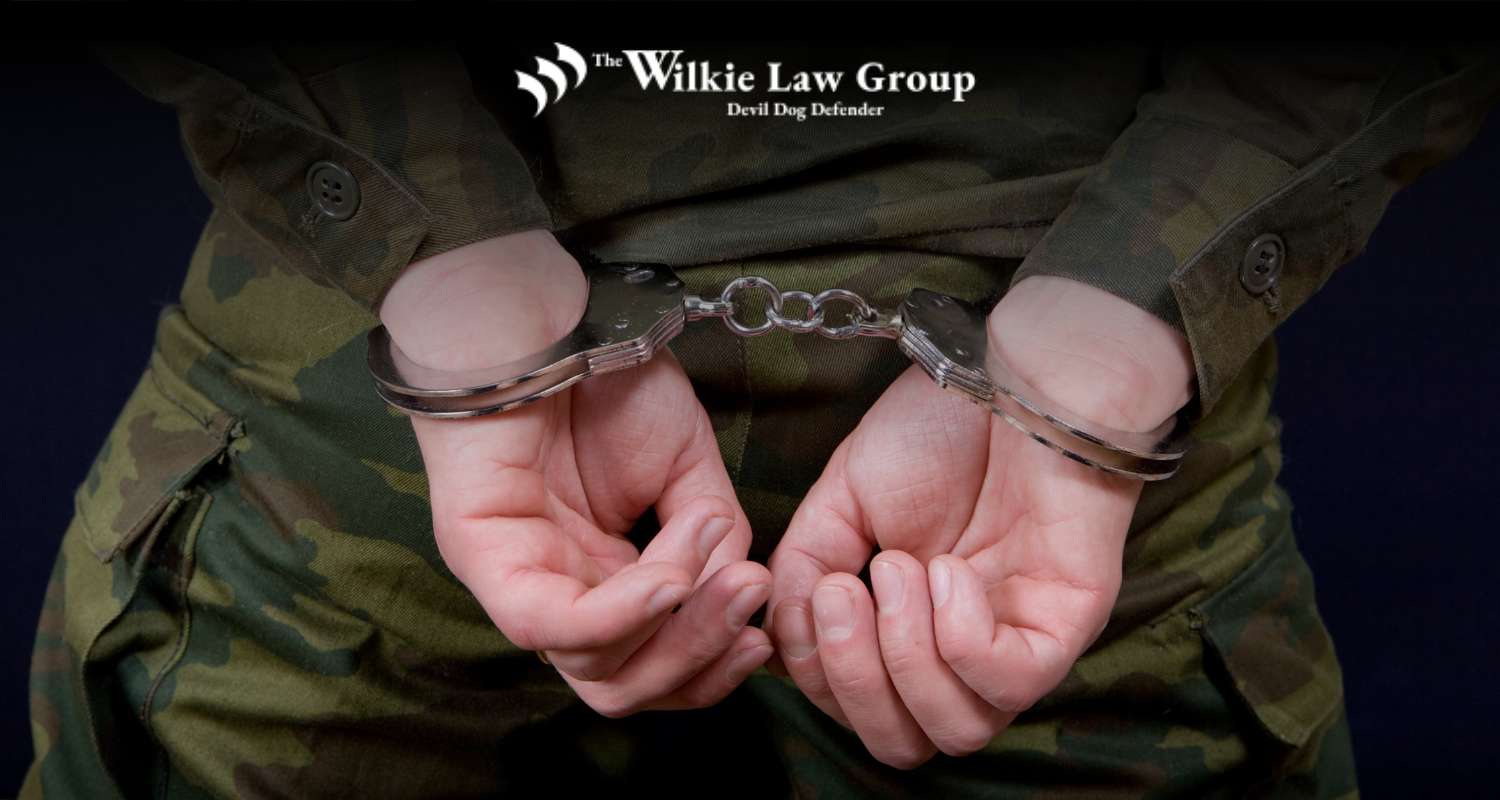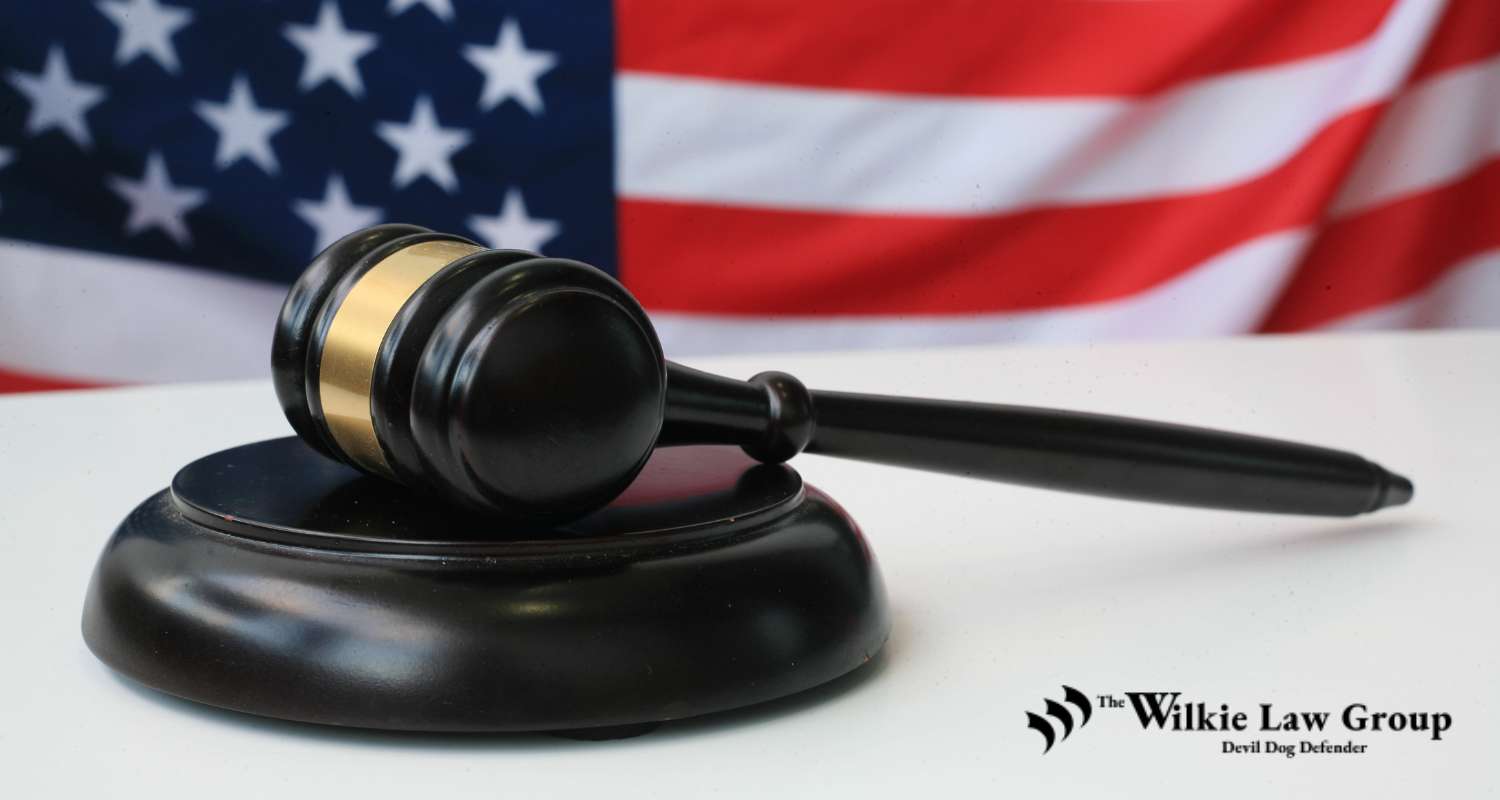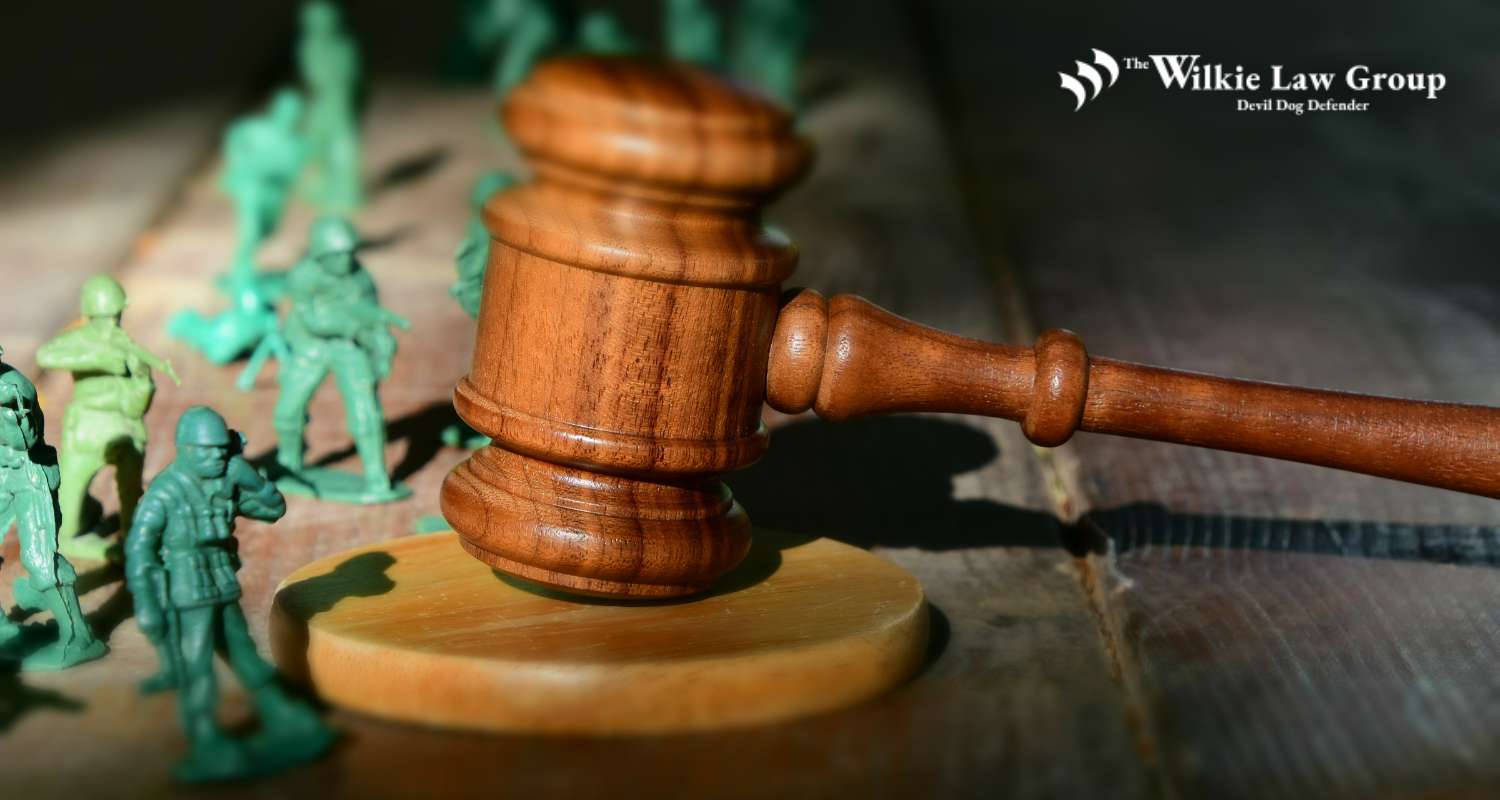Cherry Point Court Martial Lawyer
Civilian Criminal Defense Law Firm Based in Jacksonville, NC
Home » Cherry Point Court Martial Lawyer
Military Counsel
Helping Service Members Navigate The Military Justice System at MCAS Cherry Point
Facing a court martial can be one of the most stressful experiences for military service members at the United States Marine Corps Air Station (MCAS) Cherry Point. If you’re dealing with allegations of military offenses such as sexual assault, abusive sexual contact, or any other violation of the Uniform Code of Military Justice (UCMJ), it’s important to act fast – your freedom, career, and reputation are on the line.
At The Wilkie Law Group, civilian military defense attorney Aden Wilkie understands the weight of these proceedings and works tirelessly to provide an aggressive defense for military personnel in Cherry Point and beyond. As an experienced Jacksonville military defense attorney, Aden Wilkie is committed to defending service members against court-martial charges to protect their rights, future, and ability to serve.
If you or a loved one is facing a court martial at MCAS Cherry Point, don’t wait. Call (910) 333-9626 today to speak with an experienced Cherry Point court martial lawyer at The Wilkie Law Group.

What is Court Martial?
A court-martial is a formal military court proceeding that works to address alleged violations of various UCMJ articles. It functions as the military’s version of a criminal trial and is designed to maintain discipline and order within the armed forces.
Service members in the United States Marine Corps, Army, Navy, Air Force, and Coast Guard may face a court martial for offenses ranging from minor infractions such as failure to obey an order (UCMJ Article 92) to more serious crimes like sexual assault or abusive sexual contact (UCMJ Article 120).
There are three main types of court-martial: summary court-martial, special court-martial, and general court-martial. A “short martial” may also be an option for certain cases. Understanding the differences between these types of courts-martial is critical for protecting your rights and building a proper defense.
Summary Court Martial
A summary court-martial (SCM) is typically reserved for minor offenses that do not rise to the severity of a special or general-court martial. It is intended to address disciplinary issues quickly and efficiently for active duty service members.
In a summary court-martial, a single military judge, often a commissioned officer, presides over the proceedings. While less formal than other court-martials, the consequences can still have collateral consequences for your military career. Service members may face punishments like rank reduction, forfeiture of two-thirds pay for one month, or hard labor without confinement.
Special Court Martial
A special court-martial (SPCM) is considered a mid-level court-martial and is used for offenses that are more serious than those tried at SCM but still do not warrant a general court-martial. This type of proceeding is similar to a civilian misdemeanor trial and involves a military judge and a panel of three or more service members. If convicted, the accused could face penalties of up to 12 months’ confinement, reduction in rank, forfeiture of pay, fines, and a bad conduct discharge.
General Court Martial
A general court-martial (GCM) is the most serious level of military trial and is reserved for major offenses, including allegations of rape, sexual assault, homicide, and other severe military crimes. Similar to a felony trial in civilian courts, this proceeding involves a military judge, a panel of at least five service members, and the defense and prosecution teams.
A general court-martial conviction can lead to severe punishments, including dishonorable discharge, forfeiture of all pay and allowances, up to life confinement, and even the death penalty in extreme cases.
If you are facing a general court-martial at United States Marine Corps Air Station (MCAS) Cherry Point, securing an experienced North Carolina court-martial defense lawyer is crucial to protecting your constitutional rights, future, and freedom.
Short Court Martial
The short court-martial, or “short-martial” is a newer addition to the courts-martial and is reserved for specific situations involving minor offenses. It is similar to a SPCM, but allows for a streamlined process to resolve cases more efficiently. This type of proceeding may be agreed upon to avoid the formalities of a full special court-martial trial. While the penalties are often lighter, the consequences can still impact a service member’s record and future opportunities within the military.
Consulting skilled criminal defense lawyers with experience in military law ensures that your court-martial case – be it a general, special, summary, or short-martial – is handled with the attention it deserves.

Reasons for Facing a Court Martial
Service members can face a court martial for various offenses under the Uniform Code of Military Justice, the legal foundation for maintaining discipline in the armed forces. Common reasons a Marine may face a court-martial include allegations of sexual assault, abusive sexual contact, theft, drug offenses, insubordination, or dereliction of duty.
The type of trial a service member faces depends on the severity of the offense in question. For example, a service member accused of minor infractions like unauthorized absence or disobeying a lawful order might face a summary court-martial. More serious charges, such as drug possession, theft of military property, or assault, could result in a special court-martial. In cases involving severe offenses like rape, sexual assault, homicide, and other violent crimes, a general court-martial is convened, which carries the harshest penalties and requires the most aggressive defense.
The Court Martial Process at Cherry Point
For active duty military personnel, facing a court martial at Marine Corps Air Station Cherry Point can be intimidating, but understanding the legal process can help you know what to expect and protect your rights.
Military Investigations and Criminal Charges
When allegations arise, military authorities such as the Naval Criminal Investigative Service (NCIS) or the Criminal Investigation Division (CID) are tasked with conducting thorough investigations. These military investigations can begin with a complaint, report of misconduct, or suspicion of violating the Uniform Code of Military Justice.
Investigators may gather evidence by interviewing witnesses, collecting physical or digital evidence, and conducting interrogations. Service members under investigation may also be questioned during this time, so it is important to remember the right to remain silent under UCMJ Article 31 and request legal representation as soon as possible.
Once the investigation is complete, the evidence is reviewed by commanding officers to determine if formal charges will be filed. If charges are brought, the accused will face the next steps of the court martial process, starting with an Article 32 preliminary hearing.
Article 32 Preliminary Hearing
An Article 32 preliminary hearing is a critical step in the court martial process and serves as the military’s version of a civilian grand jury. During this hearing, the evidence against the accused is reviewed to determine if there is sufficient cause to proceed to a court martial. This stage is significant because it allows the defense to challenge the evidence, present witnesses, and cross-examine the prosecution’s witnesses.
The outcome of the Article 32 hearing can influence whether the charges move forward, are dismissed, or are reduced. In some cases, service members may also face pretrial confinement if they are considered a flight risk or a threat to others. Additionally, pretrial motions, such as those to suppress evidence or dismiss charges, may be filed during this time to protect the rights of the accused.
Court Martial Trial Procedures
The court martial trial is a formal process in which the prosecution and defense present their cases before a military judge and a court martial panel or jury. The panel is selected based on rank, experience, and impartiality. Typically, service members can request active duty personnel on the panel if they are active duty themselves.
During the trial, the prosecution presents evidence and calls witnesses to support the charges. The defense can cross-examine these witnesses, challenge the evidence, and present its own witnesses and arguments to counter the prosecution’s claims.
Throughout the court-martial proceedings, the defense’s role is to protect the accused’s rights, challenge weaknesses in the government’s case, and advocate for the best possible outcome.
Sentencing and Appeals Process
After a court martial verdict is delivered, the focus shifts to sentencing and appeal options. This phase determines the penalties for a conviction and outlines the steps service members can take to challenge the outcome.
- Possible Verdicts: In a court-martial, the outcomes are acquittal or conviction, the latter of which carries significant consequences. An acquittal means the service member is found not guilty and faces no penalties, while a conviction leads to sentencing that may include confinement, reduction in rank, forfeiture of pay, hard labor, dishonorable discharge, and more.
- Appeals Process: The appeals process allows service members to challenge a court-martial conviction or sentence based on procedural mistakes, improper evidence handling, constitutional violations, or unlawful command influence. A skilled court-martial appeal lawyer can review the trial record, identify errors, and present a strong case to overturn a conviction or reduce a sentence.
- Post-Conviction Relief: Post-conviction relief allows service members to seek changes to their court-martial sentence. Relief options include clemency, where a military authority reduces or suspends the sentence, and pardons, which can clear records and restore rights. Additionally, sentence reductions during post-trial reviews can shorten confinement or adjust penalties.

Rights of Service Members in Court Martial Proceedings
Like civilians in the criminal justice system, service members facing court-martial proceedings have legal rights available to them to ensure a fair trial, including the right to legal representation. The accused can be represented by a military attorney (JAG), a civilian-military defense attorney, or both.
Additionally, service members have the right to remain silent, which protects them from self-incrimination during investigations and throughout the court-martial process. Other important rights include the presumption of innocence until proven guilty, the right to review evidence, call witnesses, and cross-examine the prosecution’s witnesses.
To protect these rights, service members must remain vigilant, refrain from making statements without legal counsel, and work closely with experienced military defense attorneys who can provide guidance, build a strong defense, and ensure their rights are upheld at every stage of the proceedings.
Defense Strategies for Court-Martial Cases
Building a strong defense is critical for service members facing court-martial proceedings at any level. The right strategy can challenge the prosecution’s case, highlight weaknesses in the evidence, and protect your rights, freedom, and future.
At The Wilkie Law Group, our civilian-military attorneys may employ several defense strategies to challenge the prosecution’s case in a court martial. These include arguing lack of intent or mens rea, where the accused lacked the mental state to commit the offense, and highlighting insufficient evidence if the prosecution fails to provide credible proof. Procedural errors, such as mishandled evidence or rights violations, can also lead to reduced or dismissed charges. Additionally, when commanders improperly interfere, unlawful command influence can compromise the trial’s fairness.
Evidence is vital in court martial proceedings and can significantly influence outcomes. As such, a strong defense involves gathering and analyzing key evidence such as witness statements, physical records, and digital materials. Expert witness testimony can also help challenge the prosecution’s claims or clarify complex details like forensic evidence. Also, cross-examining prosecution witnesses can help to uncover inconsistencies, expose credibility issues, and weaken the government’s case.

How an Experienced Military Defense Attorney Can Help
Experienced military defense attorneys like those at The Wilkie Law Group provide invaluable support to service members facing court-martial proceedings. Whether challenging the prosecution’s case, identifying procedural errors, or highlighting weaknesses in the evidence, a skilled military defense attorney works to achieve the best possible outcome for the accused.
From advising on your rights and protecting you during investigations to presenting a strong defense at trial and navigating appeals, military defense lawyers ensure you are not fighting these allegations alone.
Civilian Defense Attorneys vs. Military Defense Attorneys (JAG)
When facing a court-martial, service members can be represented by a JAG attorney or a civilian military defense attorney. JAG attorneys, which stands for Judge Advocate General, are appointed military lawyers provided at no cost (think public defenders in the civilian world), but they often handle heavy caseloads, which can limit the time and attention given to each case.
On the other hand, a civilian defense attorney, like those at The Wilkie Law Group, operates in private practice and can dedicate signfiicantly more time and resources to building a tailored defense strategy. Civilian military defense attorneys also bring a unique perspective, as they are not part of the military chain of command and can aggressively defend your rights without concern for military pressures or influences.

Why Choose Aden Wilkie as Your Civilian Military Defense Attorney?
Facing court-martial charges is a serious matter that can affect every aspect of your life, from your current military career to your future opportunities. Understanding the charges against you and having a robust defense on your side from the beginning is essential to protecting your rights and freedom.
Attorney Aden Wilkie, founder and lead attorney at The Wilkie Law Group, brings extensive experience in military law and court martial defense, making him a trusted advocate for service members facing serious allegations. As a Marine Corps veteran himself and a background that includes years of representing military personnel in court martial proceedings, Aden understands the challenges service members face firsthand and the impact these charges can have on their career, freedom, and future.
He and his team are prepared to use aggressive defense strategies to challenge the prosecution’s case, scrutinize evidence, and expose weaknesses to protect their client’s rights at every stage. As a dedicated Cherry Point court martial lawyer, Aden Wilkie works tirelessly to provide the strongest and most thorough defense possible, ensuring his clients receive the focused, effective representation they deserve.
Speak With a Cherry Point Defense Attorney
If you or someone you love is facing a court martial at the United States Marine Corps Air Station Cherry Point, now is the time to act. Contact The Wilkie Law Group to speak with a dedicated Cherry Point court martial lawyer who will fight for you every step of the way. Call (910) 333-9626 or reach out online today to schedule your initial consultation and see what the Devil Dog Defender can do for you.
